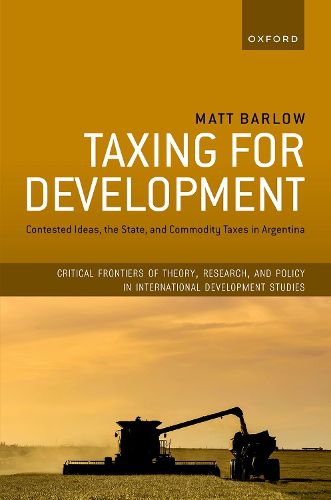Readings Newsletter
Become a Readings Member to make your shopping experience even easier.
Sign in or sign up for free!
You’re not far away from qualifying for FREE standard shipping within Australia
You’ve qualified for FREE standard shipping within Australia
The cart is loading…






The importance of tax collection for sustainable development cannot be overstated: it forms a central pillar of the UN's Agenda 2030 and offers a concrete pathway to finance development in an increasingly politicised and diminishing foreign aid landscape. However, the strengthening of tax systems in the Global South has proved to be both complex and contentious. Scholars that have approached this tax-for-development puzzle have tended to privilege interest- and institutional-based arguments to explain low levels of tax collection and problems with implementing tax reforms.
This book takes a different approach and argues that ideas about tax matter as much as interests and institutions for understanding social attitudes and responses to attempts by the state to raise revenues for development. Sometimes contested ideas about the boundaries of the state in relation to tax and development come to shape the fault lines of politics and determine the success and failure of programmes to raise revenue for development. Using the case of Argentina, the book examines, empirically, the attempts by progressive-Peronist governments of Nestor and Cristina Kirchner to finance state expenditure and social welfare via taxes on commodity (mainly soybean) exports after 2001. It traces how an idea of these taxes generated widespread conflict outside of the sector where they were levied, which entirely polarised Argentine society. Taxing for Development shows that tax is a profoundly political problem, associated with debates about the role of the state, the market, and business-state relationships. In doing so it shows how historically and socially constructed ideas of tax can become embedded in and influence debates which have normally been approached through perspectives of material interests.
This is an open access title available under the terms of a [CC BY-NC-ND 4.0 International] licence. It is free to read at Oxford Scholarship Online and offered as a free PDF download from OUP and selected open access locations.
$9.00 standard shipping within Australia
FREE standard shipping within Australia for orders over $100.00
Express & International shipping calculated at checkout
The importance of tax collection for sustainable development cannot be overstated: it forms a central pillar of the UN's Agenda 2030 and offers a concrete pathway to finance development in an increasingly politicised and diminishing foreign aid landscape. However, the strengthening of tax systems in the Global South has proved to be both complex and contentious. Scholars that have approached this tax-for-development puzzle have tended to privilege interest- and institutional-based arguments to explain low levels of tax collection and problems with implementing tax reforms.
This book takes a different approach and argues that ideas about tax matter as much as interests and institutions for understanding social attitudes and responses to attempts by the state to raise revenues for development. Sometimes contested ideas about the boundaries of the state in relation to tax and development come to shape the fault lines of politics and determine the success and failure of programmes to raise revenue for development. Using the case of Argentina, the book examines, empirically, the attempts by progressive-Peronist governments of Nestor and Cristina Kirchner to finance state expenditure and social welfare via taxes on commodity (mainly soybean) exports after 2001. It traces how an idea of these taxes generated widespread conflict outside of the sector where they were levied, which entirely polarised Argentine society. Taxing for Development shows that tax is a profoundly political problem, associated with debates about the role of the state, the market, and business-state relationships. In doing so it shows how historically and socially constructed ideas of tax can become embedded in and influence debates which have normally been approached through perspectives of material interests.
This is an open access title available under the terms of a [CC BY-NC-ND 4.0 International] licence. It is free to read at Oxford Scholarship Online and offered as a free PDF download from OUP and selected open access locations.